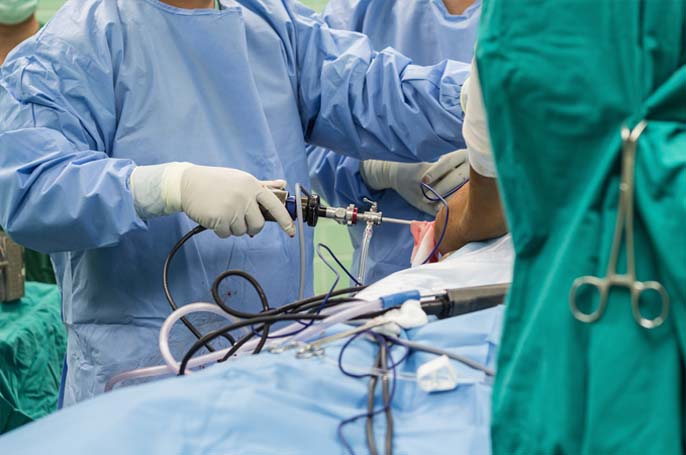Rotator Cuff Surgery

Rotator cuff repair is surgery to repair a torn tendon in the shoulder. The procedure can be done with a large (open) incision or with shoulder arthroscopy, which uses smaller incisions.
Rotator Cuff : The rotator cuff is made up of four muscles and tendons that stretch from the shoulder blade (scapula) to the upper arm bone (humerus). They move and stabilize the shoulder as it travels through various ranges of motion.
The rotator cuff performs two main functions:
- It starts the shoulder’s movement when the arm is moved away from the body
- It pulls the upper arm bone and shoulder blade together, keeping them in close contact as the shoulder moves
The most commonly injured rotator cuff muscle is the supraspinatus. This is in part because this muscle’s tendon passes through a very narrow space between the top of the upper arm bone and the underside of the shoulder’s top (acromion).
We perform three types of Rotator Cuff Surgery:
- mini open supraspinatus tendon-to-bone insertion
- arthroscopic using a small camera and a series of small incisions
- mini open rotator cuff repair
With any type of Rotator Cuff Surgery, our surgeon will inspect the injury site, sometimes using a small camera called an arthroscope. The surgeon will clear or debride any loose fragments of tendon before suturing it to the bone.
When Rotator Cuff Surgery is Recommended
We may offer surgery as an option for a torn rotator cuff if your pain does not improve with nonsurgical methods. Continued pain is the main indication for surgery. If you are very active and use your arms for overhead work or sports, your doctor may also suggest surgery.
Other signs that surgery may be a good option for you include:
- Your symptoms have lasted 6 to 12 months
- You have a large tear (more than 3 cm) and the quality of the surrounding tendon tissue is good
- You have significant weakness and loss of function in your shoulder
- Your tear was caused by a recent, acute injury
Preparing for Rotator Cuff Surgery
Your team will give you instructions on how to prepare for your rotator cuff surgery. Please follow the preoperative instructions carefully to ensure a safe procedure:
- Food and drink: You may need to stop eating and drinking a few hours before the procedure begins.
- Medications: Your doctor will tell you whether it’s safe to take your regular medications.
Since no two patients are exactly alike, be sure to talk with your doctor and care team about your individual preparations for surgery.
Candidates for Rotator Cuff Repair Surgery
Many rotator cuff injuries can be managed through nonsurgical treatments, such as anti-inflammatories, rest, ice and physical therapy. Good candidates for rotator cuff repair surgery include people who have:
- A tendon tear larger than two centimeters (cm)
- Acute tears (such as that after an injury) or known tears that are enlarging
- Significant weakness in the shoulder
- Tears in younger, more active patients
- Tried conservative treatments without success


